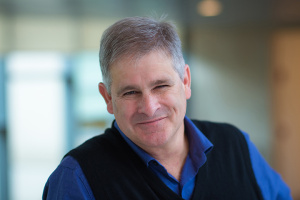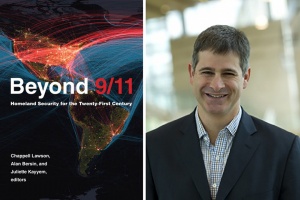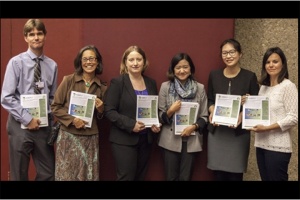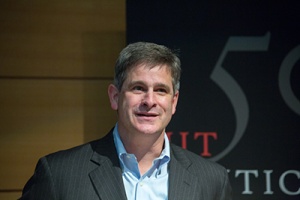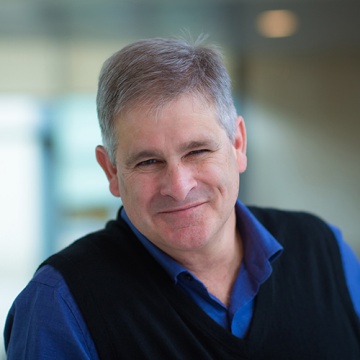
Chappell Lawson
Associate Professor of Political Science
Homeland security; Mexico; leadership; voting; media; political communication.
Biography
Chappell Lawson is an Associate Professor of Political Science at MIT. Professor Lawson's recent work has focused on homeland security policy, Mexican politics, the effect of candidates' physical appearance on their electoral success, and political leadership.
From September 2009 through February 2011, Professor Lawson was on leave from MIT as a political appointee in the Obama Administration, serving as Executive Director and Senior Advisor to the Commissioner of U.S. Customs and Border Protection. Before joining the MIT faculty, he served briefly as a Director of Inter-American Affairs on the National Security Council staff during the Clinton Administration.
Professor Lawson was a National Fellow at The Hoover Institution, Stanford University (2002-2003) and a Visiting Research Fellow at the Center for U.S.-Mexico Studies at the University of California, San Diego (1998-99). He received his Ph.D. from Stanford University in 1999 and his AB from Princeton (the Woodrow Wilson School) in 1989.
Research
Professor Lawson has a longstanding interest in Mexican politics and U.S.-Mexican relations. Among other academic work, he led four large-scale electoral panel studies in Mexico, covering the 1997 Mexico City mayoral election, the 2000 general election (panel data, postelection data), the 2006 general election, and the 2012 general election. Professor Lawson’s recent research has focused on homeland security.
Recent Publications
"An Improvised Patchwork: Success and Failure in Cybersecurity Policy for Critical Infrastructure," Public Administration Review (with Sean Atkins) accepted. (methods appendix pdf)
"Looking the Part: Television Leads Less Informed Citizens to Vote Based on Candidates' Appearance," American Journal of Political Science (with Gabriel S. Lenz) 55 (3): 574-589. July 2011. (pdf)
"Consolidating Mexico's Democracy: The 2006 Presidential Campaign in Comparative Perspective," (Johns Hopkins University Press, Forthcoming)
"Building the Fourth Estate: Democratization and Media Opening in Mexico," (University of California Press). 2002.
"Mexico's Pivotal Democratic Election," (Stanford University Press), co-edited with Jorge Domínguez. 2003.
"Looking Like a Winner: Candidate Appearance and Electoral Success in New Democracies" World Politics, (with Gabriel S. Lenz, Andy Baker and Michael Myers) 62 (4): 560-593. 2010. (pdf)
"Effects of Interviewer Gender in In-Person Interviews," International Journal of Public Opinion Research (with Francisco Flores-Macías), 20 (100-110). 2008. (pdf)
Homeland Security
- Chappell Lawson, Alan Bersin, and Juliette Kayyem, eds. Beyond 9/11: Homeland Security for the 21st Century. 2020. MIT Press.
- Chappell Lawson and Alan Bersin. “Homeland Security Comes of Age.” Chapter 1 in Chappell Lawson, Alan Bersin, and Juliette Kayyem, eds. Beyond 9/11: Homeland Security for the 21st Century. 2020. MIT Press.
- Chappell Lawson and Alan Bersin. 2020. “The Future of Homeland Security.” Chapter 15 in Chappell Lawson, Alan Bersin, and Juliette Kayyem, eds. Beyond 9/11: Homeland Security for the 21st Century. 2020. MIT Press.
- Chappell Lawson and Alan Bersin. 2020. “Collaborative Border Management.” World Customs Journal. 14 (1): April.
- Chappell Lawson. “The Trusted and the Targeted: Securing Flows of Travel and Commerce in the Twenty-First Century.” Chapter 6 in Chappell Lawson, Alan Bersin, and Juliette Kayyem, eds. Beyond 9/11: Homeland Security for the 21st Century. 2020. MIT Press.
- Chappell Lawson. 2022. “Homeland Security Federalism and Responses to Civil Unrest.” Under review at Publius: The Journal of Federalism.
- Josh Kussman and Chappell Lawson. 2021. “Want to fix the Border Patrol? Don't copy police reform efforts (azcentral.com).” Op-ed in the Arizona Republic. July 24.
- Sean Atkins and Chappell Lawson. 2021. “An Improvised Patchwork: Success and Failure in Cybersecurity Policy for Critical Infrastructure.” Public Administration Review, 81 (5) 847-861. (methods appendix pdf).
- Sean Atkins and Chappell Lawson. 2021. “Integration of Effort.” Edited by Nate Bruggeman. Paper. Belfer Center for Science and International Affairs. Harvard Kennedy School. September 2, 2021.
- Sean Atkins and Chappell Lawson. 2022. “Integration of Effort: Securing Critical Infrastructure from Cyberattack.” Conditional acceptance at Public Administration Review (Insights section).
- Sean Atkins and Chappell Lawson. 2021. “Cooperation Amidst Competition: Cybersecurity Partnership in the US Financial Services Sector.” Journal of Cybersecurity. 7(1) 1-11.
- Sean Atkins and Chappell Lawson. 2022. “Stepping into the Breach: How States Defend Critical Infrastructures from Cyberattack.”
- Alan Bersin and Chappell Lawson. 2020. “Homeland Security and Transnational Crime,” Chapter 14 in Chappell Lawson, Alan Bersin, and Juliette Kayyem, eds. Beyond 9/11: Homeland Security for the 21st Century. 2020. MIT Press.
- Alan Bersin and Chappell Lawson. 2021. “Disrupting Transnational Criminal Activity: A Law Enforcement Strategy for Homeland Security.” Edited by Nate Bruggeman. Paper. Belfer Center for Science and International Affairs. Harvard Kennedy School. May 21.
- Chappell Lawson. 2022. “Political Targeting in Democracies,” Forthcoming, Perspectives on Politics (Reflections section). Appendix pdf. UPDATED Appendix pdf April 22.
Mexican Politics (selected)
- Jorge I. Domínguez, Kenneth F. Greene, Chappell Lawson, and Alejandro Moreno, eds. Mexico’s Evolving Democracy: A Comparative Study of the 2012 Elections. 2014. Johns Hopkins University Press.
- Chappell Lawson. “The 2012 Election in Context.” Chapter 1 in Jorge I. Domínguez, Kenneth F. Greene, Chappell Lawson, and Alejandro Moreno, eds. Mexico’s Evolving Democracy: A Comparative Study of the 2012 Elections. 2014. Johns Hopkins University Press.
- Chappell Lawson and Kenneth Greene. 2014. “Making Clientelism Work: How Norms of Reciprocity Increase Voter Compliance.” Comparative Politics, 47 (1) 61-77. October.
- Jorge I. Domínguez, Kenneth F. Greene, Chappell Lawson, and Alejandro Moreno, eds. Consolidating Mexico's Democracy: The 2006 Presidential Campaign in Comparative Perspective 2009. Johns Hopkins University Press.
- Chappell Lawson. “The Mexico 2006 Election in Context.” Introduction in Jorge I. Domínguez, Kenneth F. Greene, Chappell Lawson, and Alejandro Moreno, eds. Consolidating Mexico's Democracy: The 2006 Presidential Campaign in Comparative Perspective 2009. Johns Hopkins University Press.
- Jorge I. Domínguez and Chappell Lawson, eds. Mexico's Pivotal Democratic Election: Candidates, Voters and the Presidential Campaign of 2000. 2003. Stanford University Press).
- Chappell Lawson. “Introduction” in Jorge I. Domínguez and Chappell Lawson, eds, Mexico's Pivotal Democratic Election: Candidates, Voters and the Presidential Campaign of 2000. 2003. Stanford University Press.
- Chappell Lawson and Joseph L. Klesner. “Political Reform, Electoral Participation., and the Campaign of 2000.” Chapter 4 in Jorge I. Domínguez and Chappell Lawson, eds, Mexico's Pivotal Democratic Election: Candidates, Voters and the Presidential Campaign of 2000. 2003. Stanford University Press.
- Chappell Lawson. “Television Coverage, Vote Choice and the 2000 Campaign.” Chapter 8 in Jorge I. Domínguez and Chappell Lawson, eds, Mexico's Pivotal Democratic Election: Candidates, Voters and the Presidential Campaign of 2000. 2003. Stanford University Press.
- Chappell Lawson. “Mexico’s Great Debates: The Televised Candidate Encounters of 2000 and their Electoral Consequences.” Chapter 9 in Jorge I. Domínguez and Chappell Lawson, eds, Mexico's Pivotal Democratic Election: Candidates, Voters and the Presidential Campaign of 2000. 2003. Stanford University Press
Candidate Appearance (selected)
- Gabriel S. Lenz and Chappell Lawson. 2011. "Looking the Part: Television Leads Less Informed Citizens to Vote Based on Candidates' Appearance." American Journal of Political Science. 55 (3): 574-589. July.
- Chappell Lawson, Gabriel S. Lenz, Andy Baker and Michael Myers. "Looking Like a Winner: Candidate Appearance and Electoral Success in New Democracies." World Politics. 62 (4): 560-593. 2010.
Media Freedom (selected)
- Chappell Lawson. Building the Fourth Estate: Democratization and Media Opening in Mexico. 2002. University of California Press.
- Chappell Lawson. “Election Coverage in Mexico: Crony Capitalism and its Contradictions” in Lynda Lee Kaid and Jesper Strömbäck, eds. Handbook of Election Coverage Around the World. 2008. Routledge.
- Chappell Lawson and Sallie Hughes. “Latin America’s Post-Authoritarian Media Systems. Chapter 8 in Andrew Milton and Rachel May, eds.” (Un) Civil Societies: Human Rights and Democratic Transitions in Eastern Europe and Latin America. 2005. Lexington Books.
Scholars and Government
- Chappell Lawson. “What Scholars Bring to Government and Back Again.” In Abraham Lowenthal and Mariano Bertucci, eds. Scholars, Policymakers and International Affairs: Finding Common Cause. 2014. Johns Hopkins University Press.
Teaching
| 17.50 (formerly 17.500) | Introduction to Comparative Politics |
| 17.588 | Field Seminar in Comparative Politics |
| 17.S953 |
Political Leadership |
Tools for Academic Engagement in Public Policy (edX): Designed by Professor Lawson, this short online class is for scholars and researchers interested in affecting the policy community.
News
Biography
Chappell Lawson is an Associate Professor of Political Science at MIT. Professor Lawson's recent work has focused on homeland security policy, Mexican politics, the effect of candidates' physical appearance on their electoral success, and political leadership.
From September 2009 through February 2011, Professor Lawson was on leave from MIT as a political appointee in the Obama Administration, serving as Executive Director and Senior Advisor to the Commissioner of U.S. Customs and Border Protection. Before joining the MIT faculty, he served briefly as a Director of Inter-American Affairs on the National Security Council staff during the Clinton Administration.
Professor Lawson was a National Fellow at The Hoover Institution, Stanford University (2002-2003) and a Visiting Research Fellow at the Center for U.S.-Mexico Studies at the University of California, San Diego (1998-99). He received his Ph.D. from Stanford University in 1999 and his AB from Princeton (the Woodrow Wilson School) in 1989.
Research
Professor Lawson has a longstanding interest in Mexican politics and U.S.-Mexican relations. Among other academic work, he led four large-scale electoral panel studies in Mexico, covering the 1997 Mexico City mayoral election, the 2000 general election (panel data, postelection data), the 2006 general election, and the 2012 general election. Professor Lawson’s recent research has focused on homeland security.
Recent Publications
"An Improvised Patchwork: Success and Failure in Cybersecurity Policy for Critical Infrastructure," Public Administration Review (with Sean Atkins) accepted. (methods appendix pdf)
"Looking the Part: Television Leads Less Informed Citizens to Vote Based on Candidates' Appearance," American Journal of Political Science (with Gabriel S. Lenz) 55 (3): 574-589. July 2011. (pdf)
"Consolidating Mexico's Democracy: The 2006 Presidential Campaign in Comparative Perspective," (Johns Hopkins University Press, Forthcoming)
"Building the Fourth Estate: Democratization and Media Opening in Mexico," (University of California Press). 2002.
"Mexico's Pivotal Democratic Election," (Stanford University Press), co-edited with Jorge Domínguez. 2003.
"Looking Like a Winner: Candidate Appearance and Electoral Success in New Democracies" World Politics, (with Gabriel S. Lenz, Andy Baker and Michael Myers) 62 (4): 560-593. 2010. (pdf)
"Effects of Interviewer Gender in In-Person Interviews," International Journal of Public Opinion Research (with Francisco Flores-Macías), 20 (100-110). 2008. (pdf)
Homeland Security
- Chappell Lawson, Alan Bersin, and Juliette Kayyem, eds. Beyond 9/11: Homeland Security for the 21st Century. 2020. MIT Press.
- Chappell Lawson and Alan Bersin. “Homeland Security Comes of Age.” Chapter 1 in Chappell Lawson, Alan Bersin, and Juliette Kayyem, eds. Beyond 9/11: Homeland Security for the 21st Century. 2020. MIT Press.
- Chappell Lawson and Alan Bersin. 2020. “The Future of Homeland Security.” Chapter 15 in Chappell Lawson, Alan Bersin, and Juliette Kayyem, eds. Beyond 9/11: Homeland Security for the 21st Century. 2020. MIT Press.
- Chappell Lawson and Alan Bersin. 2020. “Collaborative Border Management.” World Customs Journal. 14 (1): April.
- Chappell Lawson. “The Trusted and the Targeted: Securing Flows of Travel and Commerce in the Twenty-First Century.” Chapter 6 in Chappell Lawson, Alan Bersin, and Juliette Kayyem, eds. Beyond 9/11: Homeland Security for the 21st Century. 2020. MIT Press.
- Chappell Lawson. 2022. “Homeland Security Federalism and Responses to Civil Unrest.” Under review at Publius: The Journal of Federalism.
- Josh Kussman and Chappell Lawson. 2021. “Want to fix the Border Patrol? Don't copy police reform efforts (azcentral.com).” Op-ed in the Arizona Republic. July 24.
- Sean Atkins and Chappell Lawson. 2021. “An Improvised Patchwork: Success and Failure in Cybersecurity Policy for Critical Infrastructure.” Public Administration Review, 81 (5) 847-861. (methods appendix pdf).
- Sean Atkins and Chappell Lawson. 2021. “Integration of Effort.” Edited by Nate Bruggeman. Paper. Belfer Center for Science and International Affairs. Harvard Kennedy School. September 2, 2021.
- Sean Atkins and Chappell Lawson. 2022. “Integration of Effort: Securing Critical Infrastructure from Cyberattack.” Conditional acceptance at Public Administration Review (Insights section).
- Sean Atkins and Chappell Lawson. 2021. “Cooperation Amidst Competition: Cybersecurity Partnership in the US Financial Services Sector.” Journal of Cybersecurity. 7(1) 1-11.
- Sean Atkins and Chappell Lawson. 2022. “Stepping into the Breach: How States Defend Critical Infrastructures from Cyberattack.”
- Alan Bersin and Chappell Lawson. 2020. “Homeland Security and Transnational Crime,” Chapter 14 in Chappell Lawson, Alan Bersin, and Juliette Kayyem, eds. Beyond 9/11: Homeland Security for the 21st Century. 2020. MIT Press.
- Alan Bersin and Chappell Lawson. 2021. “Disrupting Transnational Criminal Activity: A Law Enforcement Strategy for Homeland Security.” Edited by Nate Bruggeman. Paper. Belfer Center for Science and International Affairs. Harvard Kennedy School. May 21.
- Chappell Lawson. 2022. “Political Targeting in Democracies,” Forthcoming, Perspectives on Politics (Reflections section). Appendix pdf. UPDATED Appendix pdf April 22.
Mexican Politics (selected)
- Jorge I. Domínguez, Kenneth F. Greene, Chappell Lawson, and Alejandro Moreno, eds. Mexico’s Evolving Democracy: A Comparative Study of the 2012 Elections. 2014. Johns Hopkins University Press.
- Chappell Lawson. “The 2012 Election in Context.” Chapter 1 in Jorge I. Domínguez, Kenneth F. Greene, Chappell Lawson, and Alejandro Moreno, eds. Mexico’s Evolving Democracy: A Comparative Study of the 2012 Elections. 2014. Johns Hopkins University Press.
- Chappell Lawson and Kenneth Greene. 2014. “Making Clientelism Work: How Norms of Reciprocity Increase Voter Compliance.” Comparative Politics, 47 (1) 61-77. October.
- Jorge I. Domínguez, Kenneth F. Greene, Chappell Lawson, and Alejandro Moreno, eds. Consolidating Mexico's Democracy: The 2006 Presidential Campaign in Comparative Perspective 2009. Johns Hopkins University Press.
- Chappell Lawson. “The Mexico 2006 Election in Context.” Introduction in Jorge I. Domínguez, Kenneth F. Greene, Chappell Lawson, and Alejandro Moreno, eds. Consolidating Mexico's Democracy: The 2006 Presidential Campaign in Comparative Perspective 2009. Johns Hopkins University Press.
- Jorge I. Domínguez and Chappell Lawson, eds. Mexico's Pivotal Democratic Election: Candidates, Voters and the Presidential Campaign of 2000. 2003. Stanford University Press).
- Chappell Lawson. “Introduction” in Jorge I. Domínguez and Chappell Lawson, eds, Mexico's Pivotal Democratic Election: Candidates, Voters and the Presidential Campaign of 2000. 2003. Stanford University Press.
- Chappell Lawson and Joseph L. Klesner. “Political Reform, Electoral Participation., and the Campaign of 2000.” Chapter 4 in Jorge I. Domínguez and Chappell Lawson, eds, Mexico's Pivotal Democratic Election: Candidates, Voters and the Presidential Campaign of 2000. 2003. Stanford University Press.
- Chappell Lawson. “Television Coverage, Vote Choice and the 2000 Campaign.” Chapter 8 in Jorge I. Domínguez and Chappell Lawson, eds, Mexico's Pivotal Democratic Election: Candidates, Voters and the Presidential Campaign of 2000. 2003. Stanford University Press.
- Chappell Lawson. “Mexico’s Great Debates: The Televised Candidate Encounters of 2000 and their Electoral Consequences.” Chapter 9 in Jorge I. Domínguez and Chappell Lawson, eds, Mexico's Pivotal Democratic Election: Candidates, Voters and the Presidential Campaign of 2000. 2003. Stanford University Press
Candidate Appearance (selected)
- Gabriel S. Lenz and Chappell Lawson. 2011. "Looking the Part: Television Leads Less Informed Citizens to Vote Based on Candidates' Appearance." American Journal of Political Science. 55 (3): 574-589. July.
- Chappell Lawson, Gabriel S. Lenz, Andy Baker and Michael Myers. "Looking Like a Winner: Candidate Appearance and Electoral Success in New Democracies." World Politics. 62 (4): 560-593. 2010.
Media Freedom (selected)
- Chappell Lawson. Building the Fourth Estate: Democratization and Media Opening in Mexico. 2002. University of California Press.
- Chappell Lawson. “Election Coverage in Mexico: Crony Capitalism and its Contradictions” in Lynda Lee Kaid and Jesper Strömbäck, eds. Handbook of Election Coverage Around the World. 2008. Routledge.
- Chappell Lawson and Sallie Hughes. “Latin America’s Post-Authoritarian Media Systems. Chapter 8 in Andrew Milton and Rachel May, eds.” (Un) Civil Societies: Human Rights and Democratic Transitions in Eastern Europe and Latin America. 2005. Lexington Books.
Scholars and Government
- Chappell Lawson. “What Scholars Bring to Government and Back Again.” In Abraham Lowenthal and Mariano Bertucci, eds. Scholars, Policymakers and International Affairs: Finding Common Cause. 2014. Johns Hopkins University Press.
Teaching
| 17.50 (formerly 17.500) | Introduction to Comparative Politics |
| 17.588 | Field Seminar in Comparative Politics |
| 17.S953 |
Political Leadership |
Tools for Academic Engagement in Public Policy (edX): Designed by Professor Lawson, this short online class is for scholars and researchers interested in affecting the policy community.
